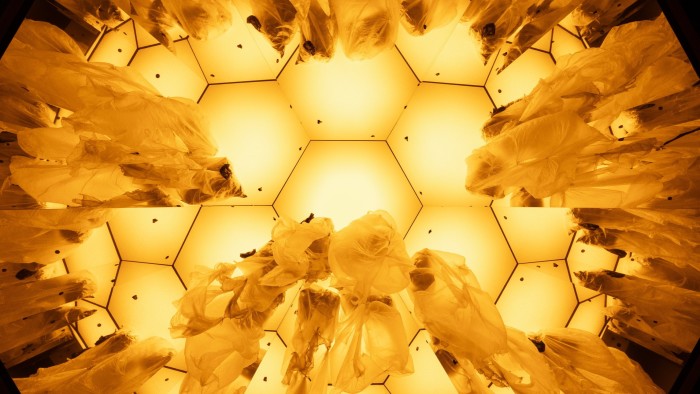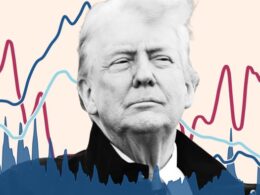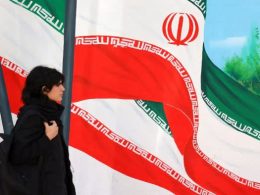Unlock the Editor’s Digest for free
Roula Khalaf, Editor of the FT, selects her favourite stories in this weekly newsletter.
Olafur Eliasson, ‘OPEN’ — The Geffen Contemporary at the Museum of Contemporary Art
It usually only takes one installation by Olafur Eliasson to get visitors flocking, phone in hand, to a museum. The Geffen Contemporary at Moca is currently showing 18 of them, many specifically created to engage with the architecture of this former police car warehouse. For one work, titled “Viewing machine for imagining oceanic futures”, the Icelandic-Danish artist has even installed a wave machine on the roof over a skylight that gives the illusion of the building being submerged in water. The rest of his technical wizardry unfolds across darkened rooms illuminated by light installations and kaleidoscopic sculptures that reflect on the environment, climate change and perception.
moca.org
María Magdalena Campos-Pons, ‘Behold’ — The Getty
Migration, memory and cultural identity form a continuous thread throughout the 35-year career of María Magdalena Campos-Pons. The Cuban-born artist’s multidisciplinary practice — which spans photography, video, installation and performance — examines the legacies of colonialism and enslavement, often drawing from her own Afro-Cuban roots, in particular Yoruba-derived Santería symbolism. The Getty presents three decades of work, including her magic-infused Polaroid prints and dreamlike multimedia installations such as “Spoken Softly with Mama” (1998), which combines archival photos of Campos-Pons’s family members with video and music.
getty.edu
Raqib Shaw, ‘Ballads of East and West’ — The Huntington
Raqib Shaw’s landscapes and interiors pull you in with their folkloric beauty: lushly rendered flora and fauna, ornate temples, majestic mountain ranges, often inhabited by enigmatic figures. Yet stormy skies and burning buildings bring personal trauma into the picture: as a child Shaw was forced to flee the conflict in his native Kashmir, eventually settling in London where encounters with masterpieces in the National Gallery led him to pursue art. Seven of his intricate paintings, which blend influences ranging from Japanese prints, Persian miniatures, Indian textile to European baroque and rococo, are on show here.
huntington.org
Joseph Beuys, ‘In Defense of Nature’ — The Broad
The German artist Joseph Beuys viewed nature as a spiritual and creative force. Embracing the role of a modern shaman, he sought to bridge the divide between humanity and the cosmos through his art. The Broad showcases 400 works that specifically highlight his deep engagement with environmental advocacy. There’s a bottled critique about ecological degradation in “Rhine Water Polluted” (1981) as well as an abundance of natural substances in his “multiples” such as “Sled” (1969) and “Felt Suit” (1970), materials which resonated with the artist for their protective and symbolic qualities. The museum will also lead an offsite public reforestation initiative inspired by Beuys’s landmark “7000 Oaks” action (1982), where thousands of trees were planted alongside stone markers across Kassel, Germany, as a collective act of remembrance in the wake of the second world war.
thebroad.org

‘Imagining Black Diasporas: 21st-Century Art and Poetics’ — Los Angeles County Museum of Art
Lacma gathers 25 years of output from artists of the Black diaspora working across Africa, Europe and the Americas. Around 70 pieces — including new acquisitions — spanning painting, sculpture, photography, works on paper, and video focus on four key themes: speech and silence, movement and transformation, imagination, and representation. Extending beyond the definition of diaspora as displacement, the show highlights how diasporic heritage has become a rich source of creative inspiration. It also delves into the role of poetry in Pan-African discourse with an accompanying catalogue filled with contributions from contemporary poets.
lacma.org

‘Alice Coltrane, Monument Eternal’ — The Hammer Museum
One of the leading figures in spiritual jazz is being honoured in her adoptive city. Detroit native Alice Coltrane, née McLeod, relocated to LA after the death of her husband, the saxophonist John Coltrane, eventually founding an ashram in the Santa Monica mountains in 1983. Her legacy as both a musician (she was a virtuoso on piano, harp and organ) and a spiritual leader is the focus of Monument Eternal, a group show of around 20 artists, including contemporary stars Rashid Johnson and Martine Syms, that explores transcendent themes related to Coltrane’s life and work. Archival gems such as the composer’s musical manuscripts, unreleased audio recordings and seldom-seen video footage also allow us to get a little closer to this sonic innovator.
hammer.ucla.edu
Find out about our latest stories first — follow FT Weekend on Instagram and X, and sign up to receive the FT Weekend newsletter every Saturday morning









